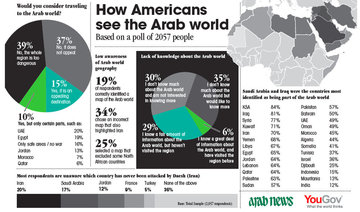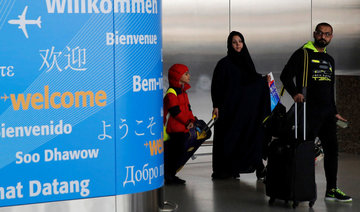DUBAI: Citizens of the US have a widespread “apathy” toward the Arab world, with Americans showing huge gaps in knowledge about the region, an Arab News/YouGov poll shows.
The “The Arab Image in the US” survey, carried out from March 17 to 21, found that 65 percent of the respondents admitted to knowing little about the Arab world, with 30 percent having no interest in finding out more about the region.
Most Americans do not follow news about the Arab world, the survey of 2,057 people showed. The amount of negative news coming from the region was cited as the biggest reason for this.
Kailash Nagdev, managing director for YouGov in the Middle East and North Africa, said the overall poll results revealed a “lack of interest” in the Arab world among Americans.
“The fact that 75 percent of Americans (who consume international news) do not follow the news about the Arab world and 65 percent of Americans do not know much about the Arab world, shows the indifference and apathy toward the region,” Nagdev said.
This exacerbates the region’s poor image in the West, the research expert added.
“The negative perception of the Arab world is largely driven by non-followership of the news regarding the Arab world. The huge knowledge gap is further accentuated by the news cycle driven by negative stories on war and terrorism,” Nagdev said.
“The lack of knowledge is also unsettling given the influence and power of the US in the region, with a huge military presence.”
But despite the “apathy,” there were signs that American consumers wanted more news from the region.
Just over half the respondents said the US media do not provide enough coverage of the Arab world and more than a third of the Americans polled said they want more news about Arab society issues, arts, science and culture.
This is a clear opportunity for the Middle East’s media outlets, Nagdev said.
“On a positive note, over half of the respondents believe media could play a positive role in better defining the image of the Arab world. This is a fantastic opportunity for the local media to expand their presence and influence in the US,” he said.
“This probably is the best time for the Arab media outlets to increase their presence in the US through social media channels, which rate among the top news sources, especially for the younger audience with no pre-conceived notions about the Arab world.”
The Arab… what?
Despite that, the poll revealed very low awareness levels of the Arab world in a sample of Americans — something that Nagdev linked to the “negative perception” the region has in the West.
The “knowledge gap” varied according to political affiliation: 42 percent of Democrat voters claim they do not know much about the Arab world but are eager to learn more, compared with 26 percent of Republican voters.
When shown three different maps, one of which illustrated the Arab World accurately, just 19 percent of respondents correctly identified a map of the Arab world, with 34 percent choosing an incorrect map that also highlighted Iran and 25 percent selecting an incorrect map that excluded some North African countries.
More than a fifth of the respondents said Agrabah — the fictional city from “Aladdin” — is a real part of the Arab world. Most respondents to the Arab News/YouGov poll were unaware that Iran had never been attacked by Daesh — with only 20 percent stating this. But 45 percent of the respondents correctly identified Saudi Arabia as the country that founded the Islamic military alliance to combat Daesh. But over three-quarters of the American respondents would not consider traveling to the Arab world. Of those, 39 percent would not consider it because they believe the whole region is too dangerous, while another 37 percent just do not find it appealing.
Most respondents to the Arab News/YouGov poll were unaware that Iran had never been attacked by Daesh — with only 20 percent stating this. But 45 percent of the respondents correctly identified Saudi Arabia as the country that founded the Islamic military alliance to combat Daesh. But over three-quarters of the American respondents would not consider traveling to the Arab world. Of those, 39 percent would not consider it because they believe the whole region is too dangerous, while another 37 percent just do not find it appealing.
Again, there was a divide according to political affiliation: Republican voters were most likely to reject the idea of visiting the Arab world due to finding it too dangerous, with 52 percent claiming this, compared to 32 percent of Democrat voters.
“It is a shame that 76 percent of Americans would not travel to the region, given the rich historical and cultural significance of the region. Cities such as Dubai have established a strong tourism brand that attracts over 14 million tourists each year,” Nagdev said.
“However, the recent events have meant a decline in tourism numbers to places such as Egypt and Jordan, which are largely dependent on the tourism industry… Perhaps with Dubai hosting the World Expo in 2020 and Qatar hosting the FIFA World Cup in 2022, the next few years will be crucial in redefining the image of the Middle East.”

























